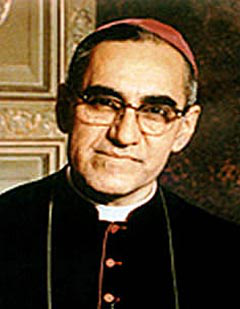Reflection on Archbishop Romero: The Martyr's Progress

Thirty-five years ago this week, on March 24th 1980, a great, holy man was martyred. Oscar Romero, the Catholic Archbishop of San Salvador in El Salvador, was shot by agents of a right wing death squad while celebrating mass in a hospital chapel. On May 23rd this year he will be formally beatified.
A cautious, quite conservative bishop when he was appointed to the largest diocese in El Salvador in February 1977, Romero had always spoken about Catholic Social Teaching and the need for justice, albeit vaguely - some might call it diplomatic, others simply timid or appeasing.
In the month of his appointment the ruling elite had 'stolen' a general election by ballot fraud. Civil society, including progressive parts of the Church, had protested. Then, on March 12th 1977, Jesuit Father Rutillo Grande and two laypeople were murdered.
This changed Romero. Radically.
Romero knew Grande and respected Grande's opinions and, above all, his integrity. When the Government tried to suggest that Grande and his companions been armed and had tried to fire upon security forces, Romero's response was blunt: "You are liars!" From that moment on, and despite a Salvadoran Bishops' Conference that was predominantly politically cautious to reactionary, Romero became the most consistent, vocal and public voice of resistance to economic injustice and human rights violations in the country.
He also became a beloved figure amongst fellow activists, progressive clergy who had previously dreaded his appointment, and the poor majority of El Salvadorans. Within days of his death he was being proclaimed 'Saint Romero of the Americas' throughout Latin America and many other parts of the world. In the Middle Ages this would have been called canonisation by acclamation. But in the contemporary Catholic Church, not altogether unknown for fast-tracking sainthoods, the process has taken more than 35 years.
One may ask: why? One argument has been that since his death has been 'politicised' there had to be a 'cooling-off' period. This does not work.
Almost all martyrdoms have a political dimension to it. In Romero's case it was simply that he has become a hero of the secular left, as much as a hero of those in the Church who struggle for social justice.
Others suggest was that since he was murdered by people who were, nominally, Catholic he could not really be called a martyr. Nonsense! By killing Romero for his Catholic Social Teaching-based advocacy, they were in effect attacking a central dimension of faith itself.
Some have also said that it's because he was close to many who embraced liberation theology, which was unpopular in Vatican circles. It is certainly true that many politically conservative Catholics had denounced him for that in his lifetime. His orthodoxy was questioned. But a more than cursory analysis of his speeches and writings reveal rather a consistent, contextual application of Catholic Social Teaching, just like Pope Francis who unblocked the canonisation process.
Whatever the case, we've officially caught up with the sensus fidelium. And it's about time too!
Follow The Jesuit Institute on twitter @JesuitInstitute




















